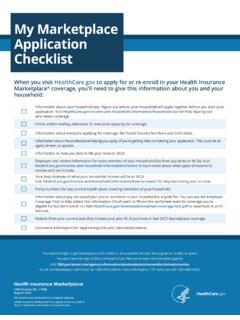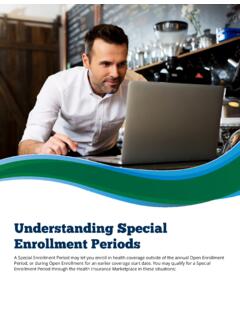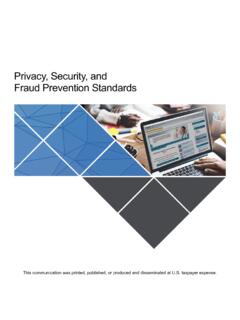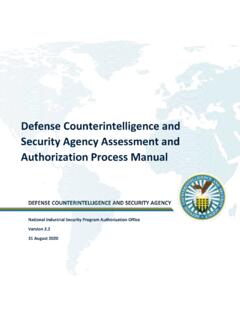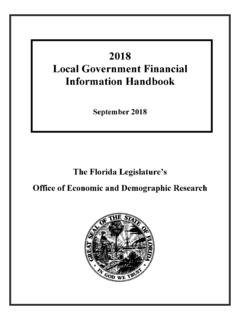Transcription of Requirements and Best Practices for Assisters on Handling ...
1 Requirements and Best Practices for Assisters on Handling personally identifiable Information Updated 2017 This Fact Sheet Applies If You: Are a Navigator or certified application counselor (collectively, an assister) in a state with a Federally-facilitated Marketplace1 Have questions about personally identifiable information (PII) Are looking for best Practices and tips on Handling PII personally identifiable Information (PII): Overview As a Navigator or certified application counselor (CAC) (collectively referred to as an assister ) helping consumers who are applying for health insurance through a Federally-facilitated Marketplace, you may encounter consumers personally identifiable information (PII).
2 This document contains suggested measures to take for protecting consumers personally identifiable information (PII) in the course of performing assister duties. PII is anything that could individually, or in combination with other data elements, identify the consumer, such as a consumer s name, address, telephone number, social security number, Marketplace application ID or other Consumers must have an opportunity to access, inspect, and/or correct their PII if they make a request to do so. Assisters are permitted to create, collect, disclose, access, maintain, store, and use consumer PII only to perform functions that they are authorized to perform as Assisters , including their required assister 1 The terms Federally-facilitated Marketplace and FFM, as used in this document, include FFMs where the state performs plan management functions and State Partnership Marketplaces.
3 2 According to the privacy and security standards set forth in Navigators grant terms and conditions, certified application counselor organizations agreements with CMS, PII is defined as information that can be used to distinguish or trace an individual's identity, either alone or when combined with other information that is linked or linkable to a specific individual. (OMB Memorandum M-17-12 [January 3, 2017]). duties, or for other purposes for which the consumer provides his or her specific, informed consent. Protecting consumers PII should be routinely discussed and monitored within your organization, and continuing education is strongly encouraged.
4 See the list below for examples of PII that you may encounter while assisting consumers. This is not an exhaustive list. If you are a Navigator or certified application counselor, a comprehensive list of types of PII that you might encounter and that you are authorized to access and use is provided in the privacy and security standards that apply to your organization s agreement or contract with CMS or grant terms and conditions, as applicable. Examples of PII You May Encounter Nam e Birth date Social Security number Alien Registration Number Home address Email address Phone number Electronic or paper federal tax returns ( , 1040, 941, 1099, 1120, and W-2) Medicaid/CHIP eligibility status Citizenship or immigration status Applicant ID Household income Qualified health plan (QHP) eligibility status Advanced payments of the premium tax credit/cost-sharing reduction (APTC/CSR)
5 Eligibility status Spoken and written language preference Tobacco usage One best practice you might want to consider is taking periodic training on the privacy and security Requirements that apply to consumer PII during the year, beyond the CMS-required training. For example, CMS offers supplemental assister webinars on complying with privacy and security Requirements . You might also find courses through your local college or university. Continuing education can increase your ability to identify PII and reinforce how to keep consumers information private and secure.
6 When Assisters Will Encounter PII PII is needed and used by the Marketplace to determine or assess consumers eligibility for health coverage and programs to lower their costs through the Marketplace, as well as to identify available coverage options for all consumers. You might also encounter PII as you help consumers select among various coverage options and enroll in coverage. As you assist consumers who are applying for and enrolling in coverage through the Marketplace, you re likely to encounter PII when assisting consumers with.
7 Creating a Marketplace account Completing and submitting an application for health coverage Assessing options for lowering costs of health coverage Selecting and enrolling in a qualified health plan (QHP) Applying for an exemption from the individual shared responsibility payment Filing an eligibility appeal Reporting changes to the Marketplace, including those that may qualify the consumer for a special enrollment period or new eligibility determination Prohibitions on Accessing and Using PII: Don t request information about a person s status as a citizen, national, or immigrant if that person is not seeking coverage for himself or herself on any eligibility application.
8 Don t request an individual s Social Security Number (SSN) if he or she is not seeking coverage for himself or herself, unless information about the individual s income is necessary to determine the applicant s household income. (Note: an individual is not required to provide his or her SSN if he or she is not applying for coverage for himself or herself, but if the individual s income is included in the applicant s household income, providing this information can help speed up the verification process.) Don t use someone s PII to discriminate against them, such as by refusing to assist individuals who are older or have significant or complex health care 3 However, under 45 CFR (c)(2), CAC organizations that are federally-funded to provide services to a specific population, such as a Ryan White HIV/AIDS program or an Indian health provider, may continue to limit their services to that population, as long as they do not discriminate within that specific population.
9 If CACs providing these limited services are approached by consumers outside of this specific population, they must refer Best Practices Related to Obtaining Consumer Authorization (or Consent) When providing assister services to a consumer for the first time, you should first explain to the consumer your role as an assister and the privacy and security Practices that you will take to ensure that the consumer s information is kept private and secure. Once you have discussed this with the consumer, you must obtain the consumer s authorization to provide assistance prior to obtaining access to the consumer s PII.
10 To help Assisters comply with this requirement, CMS has developed a model form that Assisters may adopt or modify. Records of consumer authorization must be appropriately secured and retained for at least six years, in accordance with federal regulations, unless a longer period is required by applicable law. Consumers can revoke or limit their authorization at any time. The following are a few best Practices related to the consumer authorization requirement: Prior to obtaining access to consumers PII, develop and follow standard consumer authorization procedures that are appropriate for the nature of your work.
